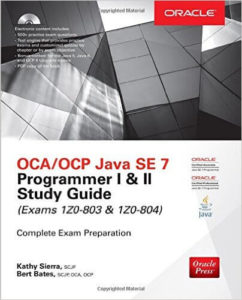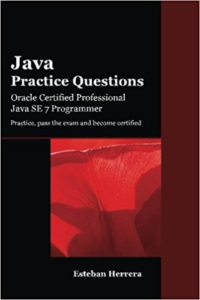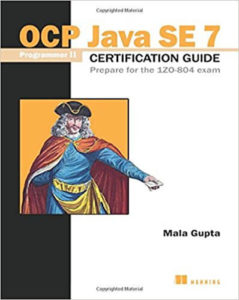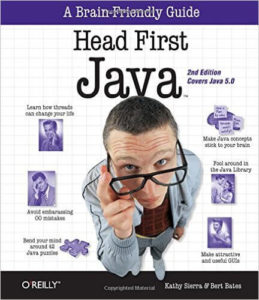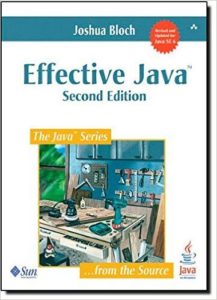Table of Contents
In the competitive world, certifications are an easy way to identify one’s experiences and clarity of the logic behind a programming language. They clearly state their presence as:
- Candidate is focused towards getting his skills identified
- He has clearly studied the language basics wide enough to accept challenges across the real-life problems
- He has got nice reading skills and preparation skills which demonstrate clear objectives towards a goal
Apart from that, obvious technical knowledge.
Certifications in Java have been equally important, as being one of the most popular languages for the Enterprise and been constantly evolving itself, Java has been present in every field, mobile, web or even Desktop.
Certifications
- Oracle Certified Associate Java Programmer(OCAJP)
- Oracle Certified Java Programmer (OCPJP)
- Oracle Certified Web Component Developer (OCWCD)
- Oracle Certified Business Component Developer(OCBCD)
- Oracle Certified Web Services Developer
- Oracle Certified Enterprise Architect
In this article, we will stick with OCJP exam and how to prepare for it with some good documentation links and books to worth looking at.
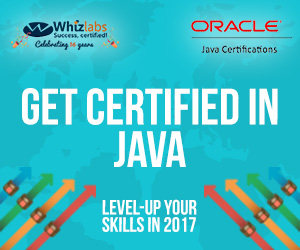
OCPJP 7 Books
Well, let’s see some books which have proven themselves excellent read for the exam.
OCJP Java SE Programmer by Kathy Sierra and Bert Bates
Magically, the writers have managed to make dull, theoretical stuff like Garbage Collection, sound awesome and interesting. The approach of humor towards every topic is an excellent move. The book is also filled with lots of practical hands-on tips for taking the exam. You quickly get an idea what to expect on the exam, and when it comes to that, you’re not spared one bit. Each chapter is followed by a set of questions, and those are very hard to get right, exactly what one is looking for.
A Comprehensive OCPJP 7 Certification Guide by S G Ganesh and Tushar Sharma
Best thing about this book is that it was designed by keeping exam objectives in mind 100% of the time. It is very well-written and organized to cover all exam objectives. The FAQ section (first chapter) will clear any doubts regarding the OCPJP certification itself as well as general Java certifications path.
In the second chapter (Pretest), you will feel how the exam is going to be, and the next twelve chapters cover each exam object in-depth in an example-driven approach which is very helpful. The Quick Refresher section summarizes the most important concepts which are useful for revising before taking the exam.
Java Practice Questions: Oracle Certified Professional by Esteban Herrara
A very important thing for an exam is to be prepared is to practice. This exam book covers excellent 120 practice questions which cover all of 12 exam topics, including answer and explanations for each question. By practicing these mock exams, you will have good understanding of how tough the real exam, what question patterns and what are the tricks to expect in the real exam. You will be well prepared for the exam.
OCP Java SE 7 Programmer II Certification Guide by Mala Gupta
This book enforces everything through examples and concise facts throughout the book. Visual aids is another best feature of this book through which complex examples like Threading are made easy to walk along. UML diagrams and Hands-on coding exercises are very approachable and one of the key points for the exam.
Online sources
Not only books can be useful, there are free online resources as well which are useful while covering basics and hidden corner of the APIs:
- The official Oracle Java API docs: It helps you a lot to look up methods you come across while studying, to find out what exceptions they throw, if any, what arguments they take etc.
- http://www.coderanch.com/forums If you have any question about Java, no matter how strange, difficult and outlandish, these people can answer them. And as an added bonus, Bert Bates is a forum-regular, so it’s great to be able to learn from one of the authors of the book.
- The Whizlabs forums: On these forums, you can get some exams, not the real one but very close. The questions are tuned to be a bit harder than “the real thing”, but that’s actually great to toughen you up. The software also has a built-in chat client so you can ask questions from the good people of Enthuware.
Other Books
Apart from the books and online sources we covered above, there are some reads which make learning Java fun, interesting and deep as well. These books do not focus on certifications in particular but they still give a very useful insight on many topics in Java. Let’s have a look at these:
Head First Java by Kathy Sierra and Bert Bates
If you think that informal style of a Java certification book wouldn’t provide enough in-depth knowledge, then you are mistaken. Despite it being a programming read, it is surprisingly easy to go through. It consist of more diagrams than the text, well, almost. It’s clear writing makes core concepts easy to understand, with plenty of visual aids and side projects to keep your keyboard and mind busy.
Effective Java by Joshua Bluch
This book is excellent when it comes to studying indispensable programmer’s rules of thumb about writing robust and clean code. The comprehensive descriptions and explanations for each item illuminate what to do, what not to do, and most importantly, why.
This compiled list of Java books contains unique teaching style that is easily digestible for even late nights, yet their content is very much relevant and detailed.

